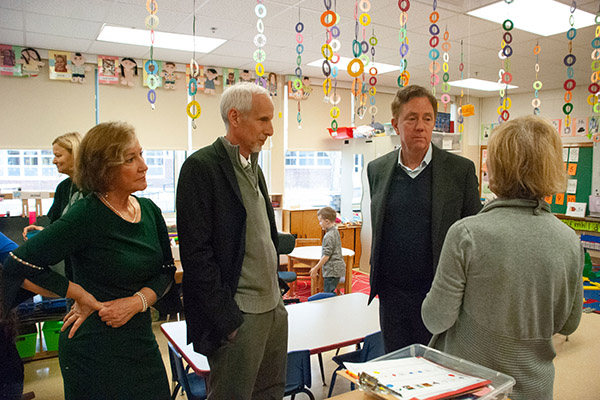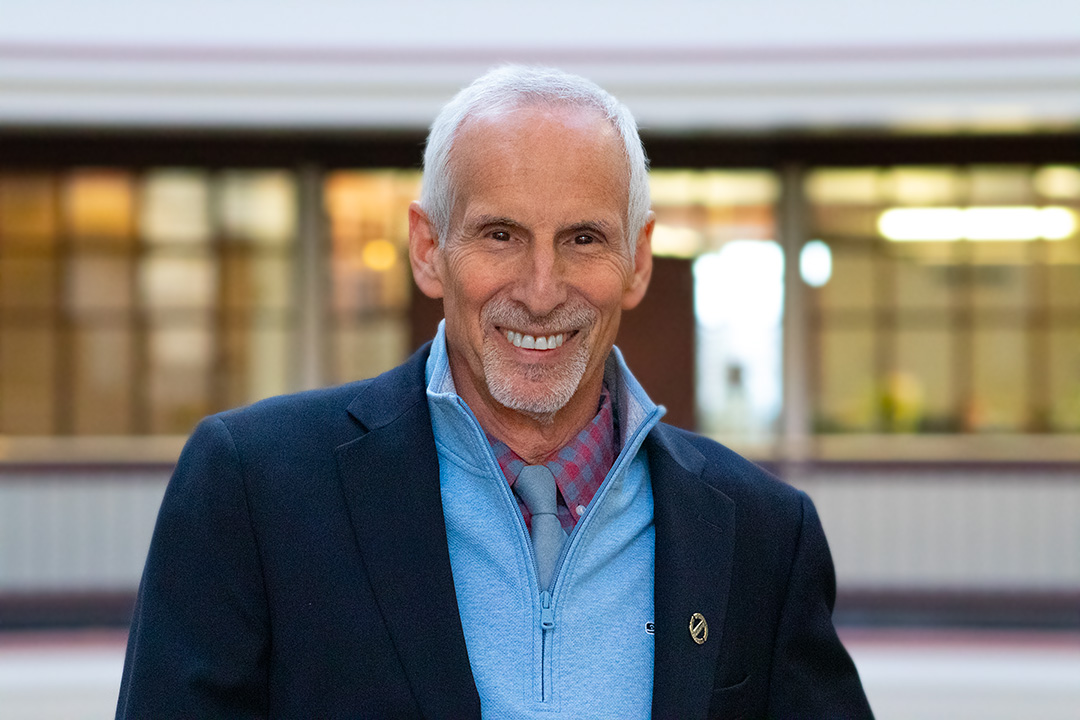Senator Needleman and Governor Lamont: Shared Services Puts Power in Towns’ Hands
Preschool Efforts Between Chester, Deep River and Essex Illustrate Shared Services

State Senator Norm Needleman and Governor Ned Lamont speak with Jennifer Nucci, supervisor of shared services at Essex Public Schools.
ESSEX, CT – State Senator Norm Needleman (D-Essex) and Governor Ned Lamont met today with local and state officials at the Region 4 Collaborative Preschool, located at the Essex Elementary School, where Sen. Needleman and school officials demonstrated the effectiveness of shared services between town. The preschool, a program between the towns of Chester, Deep River, and Essex, has operated for more than 20 years, resulting in a significant cost reduction for taxpayers and directing more resources toward the classroom. Town officials met with the governor to emphasize while their communities can collaborate on the preschool program, state rules prevent them from achieving similar results in grades K-12.
This legislative session, Sen. Needleman introduced a proposal to encourage school collaboration without mandating any kind of forced interactions between schools. Governor Lamont has worked with Sen. Needleman and town officials. His proposal, which is currently pending in the education committee, does not force school consolidation – rather, it incentivizes communities to explore cost savings at the discretion of each school district. It also creates a commission to study and share the best practices many of our towns have developed for reducing costs, so other towns can consider whether or not to adopt them.
Examples of those practices include the services shared between districts in Region 4, as well as those shared between school districts and their towns elsewhere in the state. For instance, the Town of Wilton and its public schools collaborated to have the town’s facilities director also responsible for its school buildings.
“I’m incredibly excited that Governor Lamont came here and had a very quick understanding of the benefits of what we do here and how it can apply to the rest of the state,” said Sen. Needleman. “Other small towns and even some of the other larger cities could find opportunities to begin to think for themselves and solve some of their own problems. As I said to him, if the states are the incubator of good ideas for the federal government, towns can be incubators of good ideas for the state of Connecticut.”
“Our students and teachers are not getting the adequate resources they need in the classroom, and there are more opportunities out there for us to find cost-savings so that we can redirect those resources to where they will have the greatest impact for our students,” Governor Lamont said. “Through a collaborative process that gives districts the options to make the decisions they feel are best for their communities, we can incentivize efficiencies to accomplish our shared vision of focusing efforts on the classroom.”
Chester, Deep River, and Essex operate a single central office with one set of administrators, including one superintendent, who serves the towns’ three elementary schools and high school. A number of other staff members, such as the art, music, and foreign language teachers, are employed by the towns’ cooperative agreement board, permitting staff to work across each of the towns’ schools without having to replicate the positions in each school.
In addition to Sen. Needleman, State Representative Christine Palm (D-Essex), Lon Seidman, Chairperson of the Essex Board of Education and Region 4 Supervision District and Region 4 Superintendent Dr. Ruth Levy were some of the local officials who joined the governor on the visit.
“While there is something in the Connecticut DNA that wants complete autonomy for towns, that’s not always the most efficient way to operate,” Rep. Christine Palm said. “The beauty of this plan is that it retains local control and encourages cooperation and creativity removing state-imposed obstacles to efficiency. It’s important folks understand this is not about constraining pedagogy, crimping teachers’ styles or silencing parents’ voices. In a very real way, it’s the opposite: it opens a path for technical, administrative sharing that allows greater learning and progress for our kids.”
“Our three towns are an example of what works,” said Dr. Levy. “The collaborative preschool we saw this afternoon has yielded so many positive results and we can expand on that if given the opportunity. Other towns can too.”
“Governor Lamont understands that for many towns the state’s current ‘one size fits all’ solution for regionalism is just not compatible with our local systems of government,” Seidman said. “By eliminating these restrictions and allowing towns to design their school districts we will begin to see some very creative and innovative solutions to the many challenges our schools face.”
The governor’s legislation is Senate Bill 874, An Act Concerning Education Initiatives and Services in Connecticut.
Share this page:
